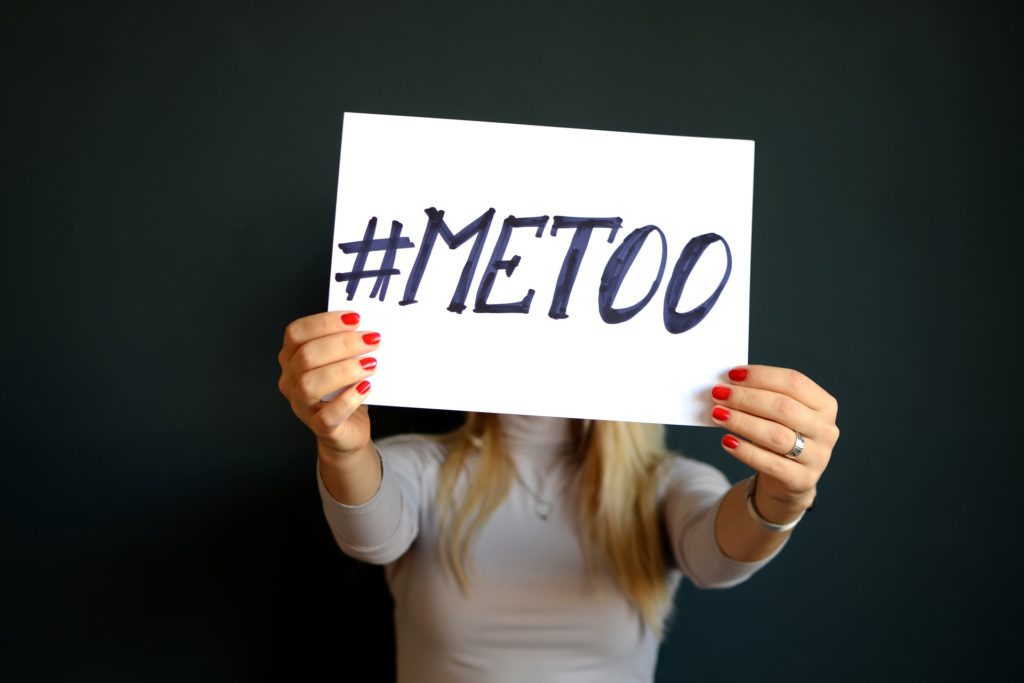
By: Margaret Potter, Staff Writer
With each news cycle, there are new reports of sexual harassment or assault allegations in spheres spanning from the entertainment world, to politics, to our local communities, academic institutions, and churches. When the public learns of these allegations through news sources and social media outlets, some people question the presence of due process for the accused in the #MeToo era.
It has been one year since allegations against Harvey Weinstein emerged, marking what most consider to be the beginning of the #MeToo movement. In the first year of the #MeToo movement, allegations of sexual harassment are on the rise. In 2018, the US Equal Employment Opportunity Commission (EEOC) filed 41 lawsuits that included allegations of sexual harassment, which is an increase of over 50% from the 2017 fiscal year.[1] The EEOC also reported a 12% increase in sexual harassment charges filed with the agency.[2]
When allegations are made through news sources and social media outlets, they immediately enter the court of public opinion where there is a divide between believing the accuser and asserting due process for the accused. But, does a person accused of sexual misconduct have a right to due process?
The right to due process is protected by the Fifth and Fourteenth Amendments, which provide that no person shall be deprived of “life, liberty or property, without due process of law.”[3] The three pillars of the due process standard include receiving notice of the allegations against an individual, having an opportunity to respond to those allegations, and having a neutral party hear the allegations and declare a ruling. [4]
The caveat to the principle of due process is that it is only applicable when the government itself or a government entity violates a person’s constitutional rights.[5] Therefore, the right to due process described in the Constitution does not hold in private actions such as those made to a media source. Herein lies the discrepancy between the constitutional right of due process and the moral principle of due process. It is a societal custom that urges citizens to see allegations from both sides, and to presume innocence until proven guilty giving the accused the opportunity to respond to allegations. [6]
The consequences of making sexual misconduct allegations have serious impacts on both the accuser and accused. An allegation of sexual misconduct can destroy the professional and personal life of an individual prior to a determination of guilt or innocence. According to the National Sexual Violence Resource Center (NSVRC), substantiated studies estimate that between 2% – 10% of sexual misconduct reports are false.[7] Many agree that there needs to be a level of fairness to one who is accused, and therefore speak out against lack of due process for those accused of these allegations. On the other hand, many agree that this fairness standard also needs to be extended to the accuser, who has a right to be heard.
Historically, those who have attempted to speak out against sexual misconduct or violence have been ignored, silenced, and/or had their credibility invalidated.[8] Although we are now observing more victims come forward to be heard, there is still a practice of calling into question the credibility of the accuser. An accuser is often doubted until their allegation is corroborated by multiple accusers stemming from the same case or controversy.[9] This holds that the majority tends to believe the “he said” until there are multiple “she saids.” Due to this unspoken requirement to not believe one accuser until there is more than one, those who try to voice their accusations often face professional and social ostracization.[10]
Both the accused and the accuser have reason to fear for sexual misconduct allegations in the #MeToo era. The accused fears for the inability to prove their innocence before being deemed guilty, as well as collapse in their professional and social lives. Whereas the accuser fears that voicing their allegations will lead to the destruction of their credibility, the mocking of their allegations, as well as collapse in their professional and social lives. Therefore, with regard due process in the #MeToo era, there is unfairness afforded on both the accused and the accuser when these allegations are judged in the court of public opinion.
Sources:
[1] https://www.eeoc.gov/eeoc/newsroom/release/10-4-18.cfm
[2] https://www.eeoc.gov/eeoc/newsroom/release/10-4-18.cfm
[3] U.S. Const. amends. V & XIV.
[4] https://www.npr.org/2017/12/22/573046500/what-kind-of-due-process-are-those-accused-of-sexual-misconduct-entitled-to
[5] Id.
[6] https://www.washingtonpost.com/opinions/the-due-process-assault-freak-out-is-a-fever-dream/2017/12/01/8f14cd80-d6d5-11e7-a986-d0a9770d9a3e_story.html?utm_term=.d39843b1db5b11e7-a986-d0a9770d9a3e_story.html?noredirect=on&utm_term=.a323341f1957
[7] https://www.nsvrc.org/sites/default/files/2012-03/Publications_NSVRC_Overview_False-Reporting.pdf
[8] https://www.theatlantic.com/politics/archive/2018/02/due-process-metoo/553427/
[9]Id.
[10] https://www.theguardian.com/commentisfree/2018/jan/08/metoo-due-process-televictions